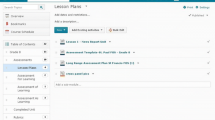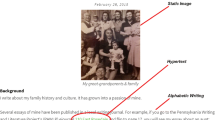Abstract
Web 2.0 offers a new type of interactive technology that may change the focus and approach of formal education in ways we are just beginning to comprehend. The new and unique qualities of Web 2.0 can be compounded in traditional educational settings by the fact that students often times have far more experience with and understanding the new technology than the teachers who are developing curriculums and setting educational goals. At the same time, Web 2.0 has become so pervasive in such a short time that it makes little sense to ignore it in educational settings. This current article suggests blogging may be the most “education friendly” of the new interactive tools. Blog posts offer students the opportunity to develop their own voice in the classroom, while commentary serves as an important reinforcement for self-reflection and continued participation. The difficulty for teachers is in understanding how to integrate, use and maintain course blogs so that they are a strong and positive educational force in the classroom. At the core of using blogs is the development of blog management strategies. Based on the authors’ use of blogs in undergraduate courses, the current paper outlines an approach to blog management.
Similar content being viewed by others
References
Bandura, A. (1977). Self-Efficacy: Toward a Unifying Theory of Behavioral Change. Psychological Review, 84, 191–215.
Becker, H. & Geer, B. (1957). Participant Observation and Interviewing: A comparison. Human Organization, 16, 28–32
Dewey, J. & Bentley, A. (1949) Knowing and the Known. Boston: Beacon Press.
Glassman, M., Bartholomew, M., & Jones, T. (2011). Migrations of the mind: The emergence of open source education. Educational Technology, 51(4), 26–31
Glassman, M. & Kang, M. (2011). The Logic of Wikis: The Possibilities of the Webb 2.0 Classroom. International Journal of Computer-Supported Collaborative Learning, 6, 93–112.
Kerawalla, L, Minoch, S, Kirkup G & Conole, G. (2008). An empirically grounded framework to guide blogging in higher education. Journal of Computer Assisted Learning, 25, 31–42.
Lin, W, Yueh, H.P., Liu, Y.L., Murkami, M., Kakusho, K. & Minoh, M. (2006). Blog as a tool to develop e-learning experience in an international distance course. In Proceedings of the Sixth IEEE International Conference on Advanced Learning Technologies (ICALT06).
McTaggert, R. (1991). Principle for participatory action research. Adult Education Quarterly, 41, 168–187.
Nelson, T. H. (1974), Computer Lib: You can and must understand computers now/Dream Machines: New freedoms through computer screens—a minority report (1st ed.), South Bend, IN: the distributors
Skinner, B.F. (1953). Science and Human Behavior. New York: The Free Press.
Stalder, F & Hirsch, J. (2002). Open source intelligence. First Monday,volume 7, number 6. http://firstmonday.org/htbin/cgiwrap/bin/ojs/index.php/fm/article/view/961/882
Stokols, D, Shalini, M., Runnerstrom, G., & Hipp, J. (2009). Psychology in an Age of Ecological Crisis. American Psychologist, 64, 181–193.
Whyte, W. (1994). Participant Observer: An Autobiography. Ithaca: ILR Press.
Williams, J. & Jacobs, J. (2004) Exploring the use of blogs as learning spaces in the higher education sector. Australasian Journal of Educational Technology, 20(2), pp. 232–247.
Xie, Y. Ke. F. & Sharma P. (2008). The effect of peer feedback for blogging on college students’ reflective learning processes. The Internet and Higher Education, 11, 18–25.
Author information
Authors and Affiliations
Rights and permissions
About this article
Cite this article
Bartholomew, M., Jones, T. & Glassman, M. A Community of Voices: Educational Blog Management Strategies and Tools. TECHTRENDS TECH TRENDS 56, 19–25 (2012). https://doi.org/10.1007/s11528-012-0583-3
Published:
Issue Date:
DOI: https://doi.org/10.1007/s11528-012-0583-3




